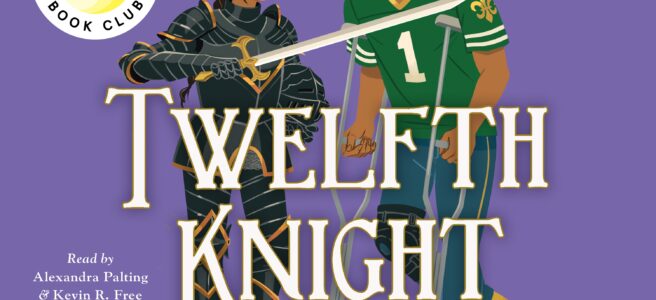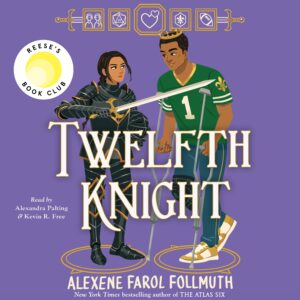A couple of weeks ago, Drew from Macmillan Publishers reached out to ask if I’d like a review copy of Twelfth Knight by Alexene Farol Follmuth. Specifically, the audiobook version. This was very serendipitous as, (a) I much prefer audiobooks and (b) I was about to go on vacation and needed something to read. I happily said yes. Now here we are! I say this by way of disclaimer – I may get a few details wrong here and there. I don’t have a text to doublecheck when I’m not sure.
Retellings of Shakespeare are a staple in modern young adult novels. Our buddy Bardfilm practically has a whole category for reviewing them. Twelfth Knight, perhaps obviously, is going to retell Twelfth Night with high school students. If you’re getting flashbacks to She’s The Man (2006) or Just One Of The Guys (1985) for the Gen-Xers , well, so did I. The natural question with most modern Shakespeare adaptations is how you modernize the, shall we say, less-than-modern aspects? The ghosts in plays like Hamlet and Macbeth are one obvious example. For comedies like Twelfth Night, it’s the “girl dresses like a boy and nobody seems to notice” thing. Not to mention the “I have a twin brother than nobody knows about” thing. You can only stretch the “suddenly I go to a different school where nobody knows me” thing so far.
Twelfth Knight doesn’t bother with any of that. Right from the start, Orsino/Olivia/Viola/Sebastian (“Bash”) all know each other as themselves. They’re all in the same classes together at the same school. Orsino is the football star, Olivia is his former girlfriend. Viola is unfortunately portrayed as the class bitch — and I say it like that for a reason, more on this later. Her brother’s a bit of an add-on, he doesn’t get much storyline unless he’s necessary for somebody else’s. Honestly at one point early in the story when I wasn’t paying attention I thought Bash was the name of Viola’s cat.
Here’s the modern twist that keeps it interesting, though — online videogames. Viola’s big into role-playing games, and as anyone with experience knows, the landscape for a girl trying to play videogames with the boys is just as dangerous as being unaccompanied in Illyria. Her interactions with the fellas come in one of three flavors — either they hate her for being better than them, they think she “owes them” whenever one of them so much as acts human toward her, or they just plain ignore her. See where this is going? Of course she plays online as a male character. (Cesario, in fact. In this world, Cesario is also the name of a character from a popular “Game of Thrones” ripoff that they all watch.)
What does this do to the plot? Orsino the football player / class president is injured, leaving him with only two things to occupy his time. First, he’s of course on the homecoming committee so he has to take part in those meetings, which also involve bitch Viola (again, trust me). Second, however, is when he’s introduced to online videogames as a way to burn off some of his unfulfilled need to compete and win at something. Where, of course, he quickly meets Cesario, a much better player than he is. With context clues it’s not long before he realizes that Cesario goes to his school, so Cesario admits to being … Sebastian.
From there I think you can see how it plays out. The fact that “Viola’s a bitch” plays heavily in the text. She’s called one all the time, by everyone, as if the word is a literal weapon straight out of one of her games. The story’s told primarily from her point of view, so we get the inside look at why she’s like that. She, like many women, lives in a world where standing up for yourself when you feel threatened gets you branded with that label. You get tired of trying to fight it, so instead you adopt it and wear it like armor. From that point forward it’s self-fulfilling, and the vicious cycle repeats.
But we know how this goes. Orsino gets to spend time with Viola (as Viola) via their committee meetings, and enlists her help to figure out why Olivia broke up with him. Olivia, meanwhile, is suddenly Viola’s best friend and confides in her a number of highly personal things that would absolutely give Orsino the answer he wants and are very much not Viola’s to tell. Meanwhile Viola’s playing the double life as Cesario, who Orsino thinks is Sebastian. Who, by the way, has no idea that he’s been pulled into this whole story. Orsino learns who the real (i.e. not a bitch) Viola is, Viola comes out of her armor and learns to trust people. Except there’s still that whole “I’m actually also Cesario” thing that she has yet to tell him. How will that work out?
I like this version. I like how it pretty seamlessly blends the double lives of these kids, going to school with one face and then getting behind the computer with another one. The author manages to tell a new story with new dynamics while still keeping many of the core elements of the original story.
Two things I didn’t love. One, it tries a little too hard to map to the original where it doesn’t need to. This story has all kinds of new characters – parents, best friends, etc… – yet the author still felt obliged to sneak in other football players like Volio, Curio, and Aguecheek. None of those names fit the story’s context (Orsino is borderline as it is), and it would have made the novel stronger to just change them to something unrelated or drop the characters completely.
Second, there are some reasons this doesn’t work well in audiobook. As part of creating an original story, the author has added diversity to the story. Fine. Orsino is black. Viola is Viola Reyes, who I believe is supposed to be Phillipino? Olivia is Olivia Hadid, and presumably Arabic? These details are part of the story. Time is spent with extended families, among other things. Parents’ expectations of their children is a driving force in the main characters’ growth. I’m ok with all of that (and, as I noted at the outset, I apologize if I confused any of the details). My point is that it doesn’t work in audiobook. With just two narrators, the voices all start to blend, and you end up differentiating Olivia and Viola by which one is perky and which one is nerd-bitchy, and not at all by the fact that they’re supposed to be from opposite ends of the world culturally. It ends up feeling like a disservice is done to their backstories. Why add cultural diversity if it ends up whitewashed?
Overall, I’d certainly recommend it. A lot of ground is covered that has nothing to do with Shakespeare. Orsino’s worried that a late injury has destroyed his chances of playing football in college. Viola is not the only girl who discovers the hard way that a boy being nice to you can suddenly turn very dark. All of these kids are in a constant battle of trying to figure out who they can trust (their parents included), while navigating all the obstacles that life’s going to throw in their way. All while trying to come to terms with the difference between the person they want to be and the person they’re projecting to the world, and when it’s safe to reconcile the two. Available now on Amazon (and not just in audiobook!)


